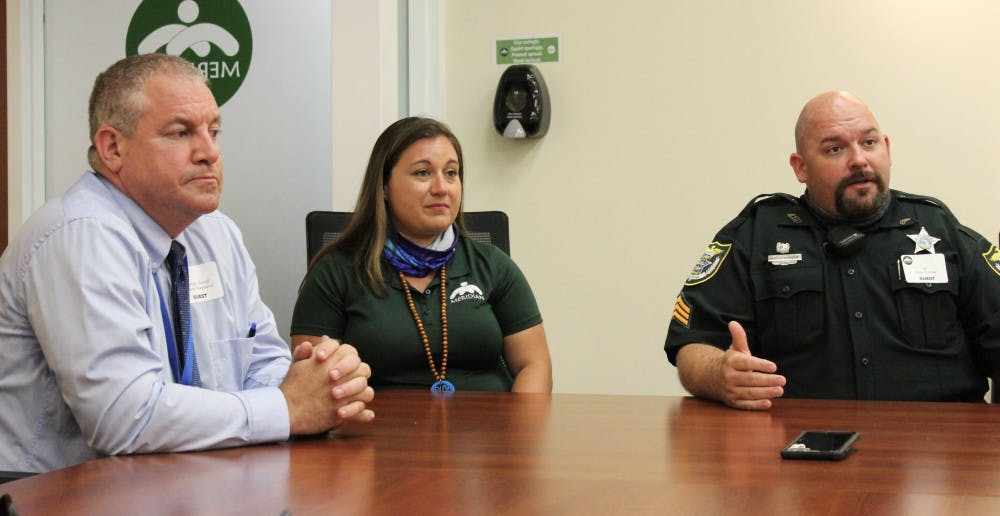The Alachua County Sheriff's office announced its new co-responder program Monday.
The program pairs a mental health specialist with a sheriff deputy trained in crisis intervention, said Alachua County Sheriff Sadie Darnell at a Monday press conference. Together, the team began responding to calls related to mental health crises and substance abuse on June 2.
Meridian Behavioral Healthcare, a Florida nonprofit mental health organization, partnered with the Alachua County Sheriff’s Office to staff the mental health specialists, said Donald Savoie, the organization’s CEO.
Meridian also partnered with Gainesville Police to launch a co-responder program in 2018, Savoie said. Darnell said the program is meant to decrease the number of people incarcerated as a result of a mental health crises. She said she viewed GPD’s co-responder program as a model for ACSO’s.
Darnell said she initially didn’t know if Gainesville’s program could work countywide because ACSO’s jurisdiction is ten times larger than GPD’s, but said she was convinced when she saw GPD’s results.
According to Darnell, GPD responded to 710 mental health-related calls last year. Of the 71 cases that could have led to arrests, 91 percent of them weren’t arrested but approached with mental health resources.
GPD’s program helped residents avoid about 3,000 days of jail time, she said.
“Behind those numbers are individuals who have unique situations,” Darnell said. “The response from law enforcement to do this in a better way is remarkable.”
Sgt. Paul Pardue, supervisor of ACSO’s co-responder program, said the team chooses which calls to respond to based on severity Monday to Thursday from 9 a.m. to 7 p.m.
“Monday through Thursday, kinda seems like we set ourselves up for a nice weekend,” Pardue said, adding that the program chose those days because the majority of calls occur on those days.
In addition to responding to mental health crises, the team is also focusing on responding to crimes, such as shoplifting and trespassing, which can sometimes be linked to mental health issues.
“We don’t want to put people in jail and criminalize mental health or substance abuse issues,” he said.
Repeat callers make up a large percentage of calls they respond to, Pardue said.
The team checks up on repeat callers after crises, said Briana Kelley, the team clinic specialist. She said the goal is to build community trust so people are encouraged to seek help when they need it.
“Once we give them an experience in a positive light, they call and request us specifically,” Kelly said.
Follow-ups are also used in cases outside the team’s schedule, Pardue said. Each shift starts with checking in on people the team was unable to respond to. He said follow-ups show care, which can encourage people to get the help they need.
The program costs Meridian $80,000, Savoie said. The cost is covered by Lutheran Services Florida, a Florida-based religious nonprofit organization. It hasn’t added to ACSO’s budget because the sheriff’s office repurposed a deputy, Pardue said.
Darnell said she hopes the ACSO’s co-responder program expands in the future. Each additional team will cost more than $100,000 when factoring in deputy training, vehicle cost and other supplies, she said.
The partnership isn’t a reaction to current calls for police reform, but a continuation of efforts by ACSO to respond to community mental health needs, she said.
“This need is going to continue to grow, so let’s get better at what we do,” Darnell said. “Have a better plan in place instead of doing the same old, same old thing.”
Sgt. Paul Pardue, supervisor of ACSO’s co-responder program (right), explains how Briana Kelley (middle) and Dan Maynard (left) will respond to mental health crises. Kelley is a mental health clinic specialist and Maynard is an ACSO deputy trained in crisis intervention.






